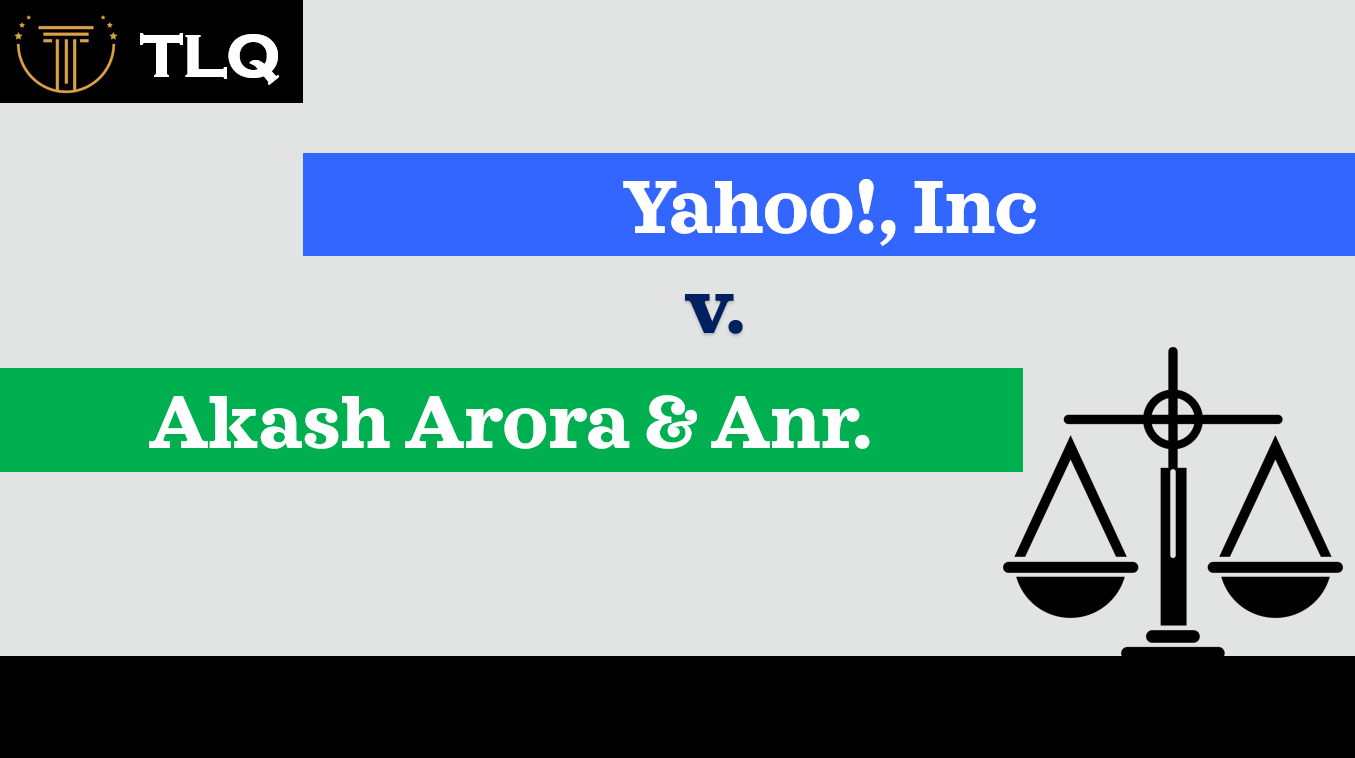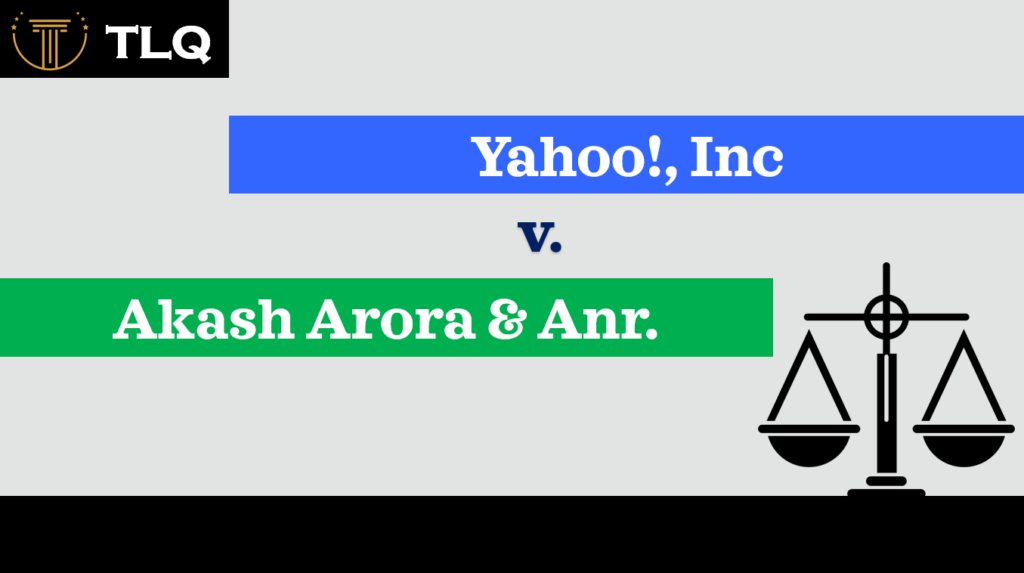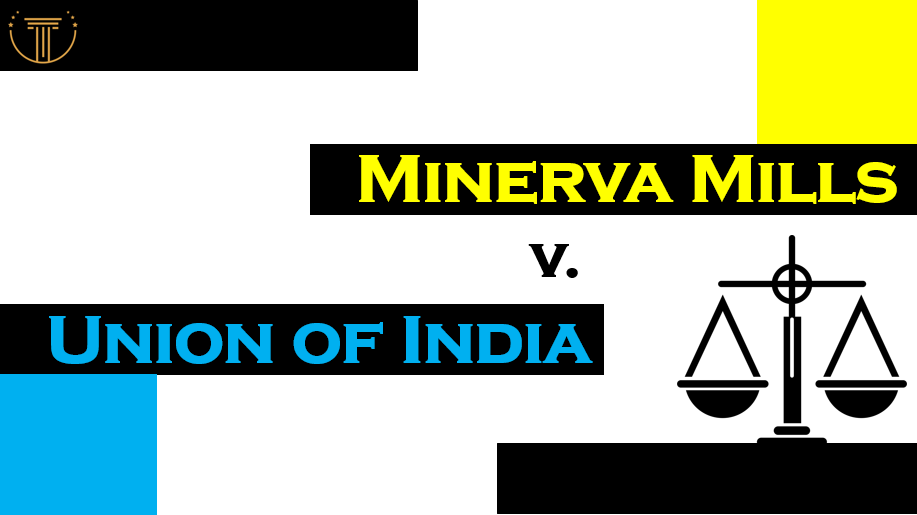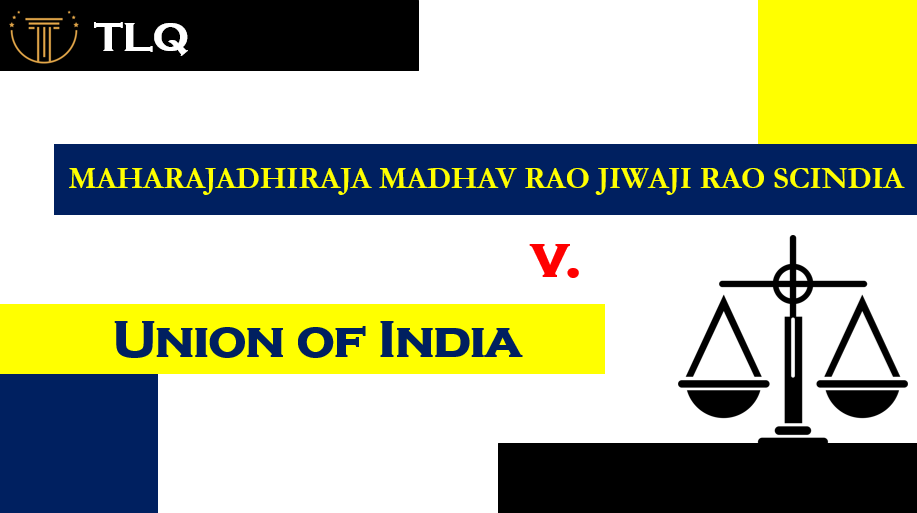Published On: 20th April, 2024

Citation
1999 IIAD Delhi 229, 78 (1999) DLT 285
Background
Using the trademark or domain name “Yahooindia.Com” or any other mark confusingly similar to the plaintiff’s trademark “Yahoo!” as a trademark, the plaintiff filed this lawsuit in order to obtain a permanent injunction barring the defendants, their associates, employees, and agents from conducting any kind of business, as well as from marketing, selling, and engaging in any other manner in the sale of goods or services on the Internet or elsewhere.
The plaintiff has furthermore invoked Order 39 Rules 1 & 2 of the Code of Civil Procedure in order to request an ad interim temporary injunction, which would stop the defendants from using the trademark or domain name “Yahooindia.Com,” or any other mark or name that is confusingly similar to Yahoo India, in any way related to conducting business, selling, offering for sale, advertising, or participating in any other way in the sale or exchange of goods via the Internet.
To prevent the defendant from carrying out their current actions, the plaintiff asked for both a temporary and permanent injunction.
Facts
In the view of the world community, Yahoo INC., the plaintiff, is the owner of the well-known trademark “Yahoo” and the domain name “yahoo.com,” both of which have a distinct identity and reputation. On top of that, Yahoo was a legally recognized business beginning in 1995 and, except for India, possesses trademark registrations in 69 nations worldwide. Yahoo’s corporate headquarters are in Sunnyvale, California.
The defendant, Akash Arora, bought a domain name and dubbed his company “Yahoo India” to imitate the internet service providers offered by Yahoo Inc. In response, Yahoo Inc. filed a request for an interim injunction, ordering the defendant to stop using the domain name “yahooindia.com” or any other name that is similar to its trademark. It filed a lawsuit against Akash Arora, claiming the latter tried to pass off his services as those provided by Yahoo Inc. and that the former utilized a trademark confusingly similar to its namesake. They got around this by suing Akash Arora.
Issues
- Does domain name protection fall under the purview of intellectual property rights?
- Does the defendant’s registration of “Yahoo India” constitute to a passing-off of Yahoo INC.’s services? In light of the relevant provisions of the Trade and Merchandise Marks Act, would this, if it occurs, amount to trademark infringement against the plaintiff?
Arguments
- Petitioner’s Argument
The legal representative for the petitioner argued that the plaintiff is the legitimate owner of the well-known trademark “Yahoo!” and domain name “Yahoo.Com,” which have amassed a notable reputation and goodwill. On the other hand, the defendants have been utilizing the term “Yahooindia” for services that are either identical to or misleadingly similar to the plaintiff’s trademark “Yahoo!” to pass off their goods and services as the plaintiff’s trademark.
It was argued that the plaintiff’s domain name, which functions as a trademark, should be protected against passing off as a trademark to the same extent. He stated that there is overlap and that trademarks and domain names do not conflict with one another when it comes to services offered under them.
Thus, the defendants have exactly replicated the structure, contents, style, color scheme, and source code of the plaintiff’s previous regional section on India at Yahoo.com.sg, passing off their services as the plaintiff’s, by establishing a confusingly similar trademark called “Yahooindia.”
- Defendant’s Argument
The defendant’s attorney denied the aforementioned claims, claiming that as trademark laws in India pertain only to products, the circumstances of the present case—which only involves goods do not fall under the purview of the Indian Trade Marks Act. Additionally, the plaintiff’s “Yahoo!” domain name and trademark were said not to be registered in India. Both a passing-off action and an action for violation of the registered mark are so precluded. This is because services rendered by both the plaintiff and the defendants do not qualify as products under the Indian Trade Marks Act, which solely addresses commodities and excludes services.
No passing-off action can be maintained against the defendants since there is no possibility of deceit due to the defendants’ use of disclaimers. asserted further that “Yahoo!” cannot have been unique since it is a broad dictionary term that is not emitted. said further that there is no possibility of deceit because the defendants have been employing disclaimers. Moreover, he contended that since all internet users and website visitors are technologically sophisticated and educated, it is unlikely that a client would arrive at the defendants’ website intending to visit the plaintiff’s website. They thus contended that for a claim of trademark infringement and passing off to be valid, it cannot be the situation of an innocent buyer.
Judgment
A restraining order was issued by the court against Akash Arora after he was found guilty of infringing on Yahoo INC.’s trademark. Based on the theory that Arora was using a domain name that was confusingly similar to Yahoo INC. and providing services that were similar to those provided by Yahoo INC., this was considered to be a kind of cybersquatting. Yahoo Inc. was cited as a leading illustration of how a company’s name and trademark significantly influence the value of its reputation. Hence, it was determined that the defendant had to permanently cease using the domain name “yahooindia.com” as the word “Yahoo” had established its reputation. This was due to the conclusion that the word had acquired its repute. The authority to stop third parties from misrepresenting Yahoo Inc.’s product has been granted.
Conclusion
One significant development in the Indian cybersquatting landscape is this case. Cybersquatting is taking use of other people’s trademarks for personal gain through the use, sale, or registration of a domain name is a common practice in the digital age. Not only did it address the problem of cybersquatting before the Delhi High Court, but it also set a precedent by recognizing that domain names need to be afforded the same legal protection as traditional trademarks.
India’s intellectual property laws had a significant gap regarding the handling of domain names before this decision. Emblems have been legally protected since 1958 by the Trade and Merchandise Marks Act[1], however, domain names are occasionally viewed as confusing. The distinctiveness examination required for trademark registration has been hampered by the fact that domain names have generally been employed as functional website identities rather than distinctive brand identifiers. Because it was difficult to understand, this created uncertainty in domain name disputes and exposed trademark owners to abuse by cybersquatters.
As the decision in the case addressed, domain names are not only practical instruments; they will also serve as accurate markers of a brand’s goodwill. The Delhi High Court discussed the inherent value and importance of domain names in the current digital economy by evaluating them in comparison to logos. By placing domains firmly inside the purview of trademark law, this decision provided brand owners with more legal protection against cybersquatting and the unauthorized use of their logos in domains.
The use of Trade and Merchandise Marks Act Sections 29[2] and 27[3] was one of the primary crime hypotheses examined in this case. Section 29[4] addresses trademark infringement and guards against unapproved use of marks that are confusingly close to or identical to trademarks that have been registered. However, trademark registration is addressed in Section 27,[5]this further outlines the requirements for deciding whether a mark is eligible for trademark registration. As these legal guidelines are deciphered in terms of domains, the court docket made it obvious that domains are likely registered as emblems as long as they meet the specifications for the area of knowledge and non-functionality.
In addition, the verdict supported the passing-off theory under Indian trademark law. While misrepresenting its services or goods as those of other, more sophisticated clients and maybe damaging the image of the official logo, a celebration engages in passing off. When someone manages a website under a name that closely matches a well-known and identifiable brand, passing off may also occur on the issue of domains, prompting customers to believe there may be a false relationship between the two organizations.
According to the court’s view of passing off when it comes to domains, protecting a logo’s reputation and customer agreement is crucial in the online market. Recognizing the potential for confusion and dishonesty due to similar domain names, the court affirmed the need for stringent procedures to prevent cybersquatting and other forms of trademark infringement in the digital sphere.
Finally, the case represents a significant advancement in Indian intellectual property law, particularly regarding cybersquatting and area call disputes. Given that domain names now have legal protection and are categorized as valuable assets deserving of trademark protection, the Delhi High Court’s decision has provided much-needed clarity and balance for brand owners operating in the digital space.
Reference(s):
[1] Trade and Merchandise Marks Act 1958, No. 43, Acts of Parliament, 1958 (India)
[2] Trade and Merchandise Marks Act 1958, s. 29, No. 43, Acts of Parliament, 1958 (India)
[3] Trade and Merchandise Marks Act 1958, s. 27, No. 43, Acts of Parliament, 1958 (India)
[4] Supra at 1
[5] Supra at 2



